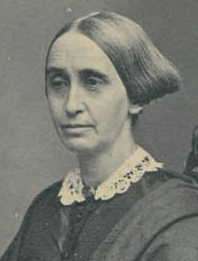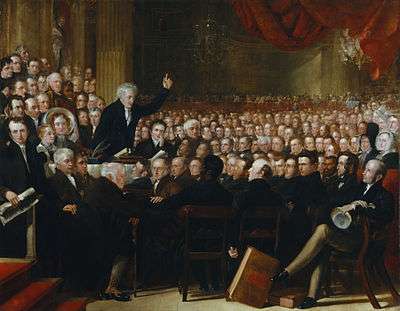Mary Grew
Mary Grew (September 1, 1813 – 1896) was an Anti-Slavery activist. She was a public speaker when abolitionism was unpopular. She attended and was prevented from speaking at the World Anti-Slavery Convention in 1840. After slavery was abolished she turned her attention to preaching and women's suffrage.
Mary Grew | |
|---|---|
 c. 1863 | |
| Born | September 1, 1813 Hartford, Connecticut |
| Died | October 10, 1896 (aged 83) Philadelphia, Pennsylvania |
| Parent(s) | Henry Grew |
Life
Grew was born in Hartford in 1813.[1] Her father was Henry Grew who was an abolitionist religious writer of strong opinions. Her father married four times and Mary's mother was his third wife Kate Morrow who died in 1845.[2]
In 1834 she moved to Boston, and later to Philadelphia. Grew was a radical abolitionist. When the Boston Female Anti-Slavery Society was formed, she became a member.[1] In Philadelphia she joined the Philadelphia Female Anti-Slavery Society and served as its corresponding secretary. She wrote their annual reports until 1870.[1] It was a correspondence between Mary and Maria Weston Chapman concerning a women's anti-slavery committee that created the first Anti-Slavery Convention of American Women in New York in 1837.[3]
She was a member of the Woman's Anti-Slavery Convention in 1838, which held its sessions in Pennsylvania Hall, surrounded by a furious mob, which destroyed the building by fire a few hours after the convention adjourned.[1]

- ^ The Anti-Slavery Society Convention, 1840, Benjamin Robert Haydon, 1841, National Portrait Gallery, London, NPG599, Given by British and Foreign Anti-Slavery Society in 1880
Grew and her father were invited to the World Anti-Slavery Convention beginning 12 June 1840 in London. They departed on the ship Roscoe on 7 May 1840. Other delegates aboard the ship were James and Lucretia Mott, Emily Winslow and her father Isaac, Abby South and Elizabeth Neall. According to Mrs. Mott, Mary was "quite intimate" with George Bradburn.[4] After they arrived, Bradburn traveled with the Grews to various locations, including Birmingham, as Mary wanted to see her father's birthplace.[4]
Before and during the convention, there was fierce debate about the participation and seating of women delegates and attendees. Her father sided with the British organisers and spoke in favour of the men's right to exclude women, knowing that this would exclude Mary.[5] Eventually women were allowed into the convention, but they were not allowed to speak and they had to sit separately.
In 1854 a similar public debate took place when Mary and her father attended the fifth annual National Women's Rights Convention in Philadelphia. Her father debated with Lucretia Mott, during which he lauded the supremacy and authority of men.[5]
After slavery was abolished she devoted her energies to the enfranchisement of women. She also became a member of a Unitarian where there were sexual discrimination in the organisation. She was able to preach as she found the pulpits of Unitarian churches open to women. She was also able to preach in northern New England and the pulpits of Free-will Baptists, Methodists and Congregational churches. She was one of the founders of the New Century Club, of Philadelphia. She was also one of the founders of the Pennsylvania Woman Suffrage Association and she became its president.[1]
In November 1870 she chaired the first anniversary meeting of the Pennsylvania Woman Suffrage Association and the poet John Greenleaf Whittier was amongst those expected. Whittier sent his apologies and a poem in tribute title "How Mary Grew".[2]
How Mary Grew
With wisdom far beyond her years
And graver than her wondering peers ...
She dared the scornful laugh of men,
The hounding mob, the slanderer’s pen.
She did the work she found to do,—
A Christian heroine, Mary Grew!
The freed slave thanks her; blessing comes
To her from women’s weary homes;
The wronged and erring find in her
Their censor mild and comforter.
The world were safe if but a few
Could grow in grace as Mary Grew!
So, New Year’s Eve, I sit and say,
By this low wood-fire, ashen gray;
Just wishing, as the night shuts down,
That I could hear in Boston town,
In pleasant Chestnut Avenue,
From her own lips, how Mary Grew!
And hear her graceful hostess tell
The silver-voicëd oracle
Who lately through her parlors spoke
As through Dodona’s sacred oak,
A wiser truth than any told
By Sappho’s lips of ruddy gold,—
The way to make the world anew,
Is just to grow—as Mary Grew!
In literature
In 1991 Ira Vernon Brown published a biography of Grew.[2] Mary, appears as a character in Ain Gordon's 2013 play If She Stood.[6]
References
- Mary Grew in "Woman of the Century", Willard and Livermore, page 371, 1893
- Ira Vernon Brown (1991). Mary Grew, Abolitionist and Feminist, 1813-1896. Susquehanna University Press. pp. 140–145. ISBN 978-0-945636-20-5.
- Brown, Ira V. ""AM I NOT A WOMAN AND A SISTER?" THE ANTI-SLAVERY CONVENTION OF AMERICAN WOMEN, 1837-1839". Pennsylvania State University. Retrieved 31 July 2014.
- Mary Grew, Abolitionist and Feminist, 1813-1896, accessed 19 July 2008]
- Dorsey, Bruce. Reforming Men and Women: Gender in the Antebellum City, 2002, ISBN 0-8014-3897-7. p.179, Accessed 21 July 2008
- Salisbury, Stephen. "Painted Bride productions on 19th century women touch familiar issues" Philadelphia Inquirer (April 26, 2013)